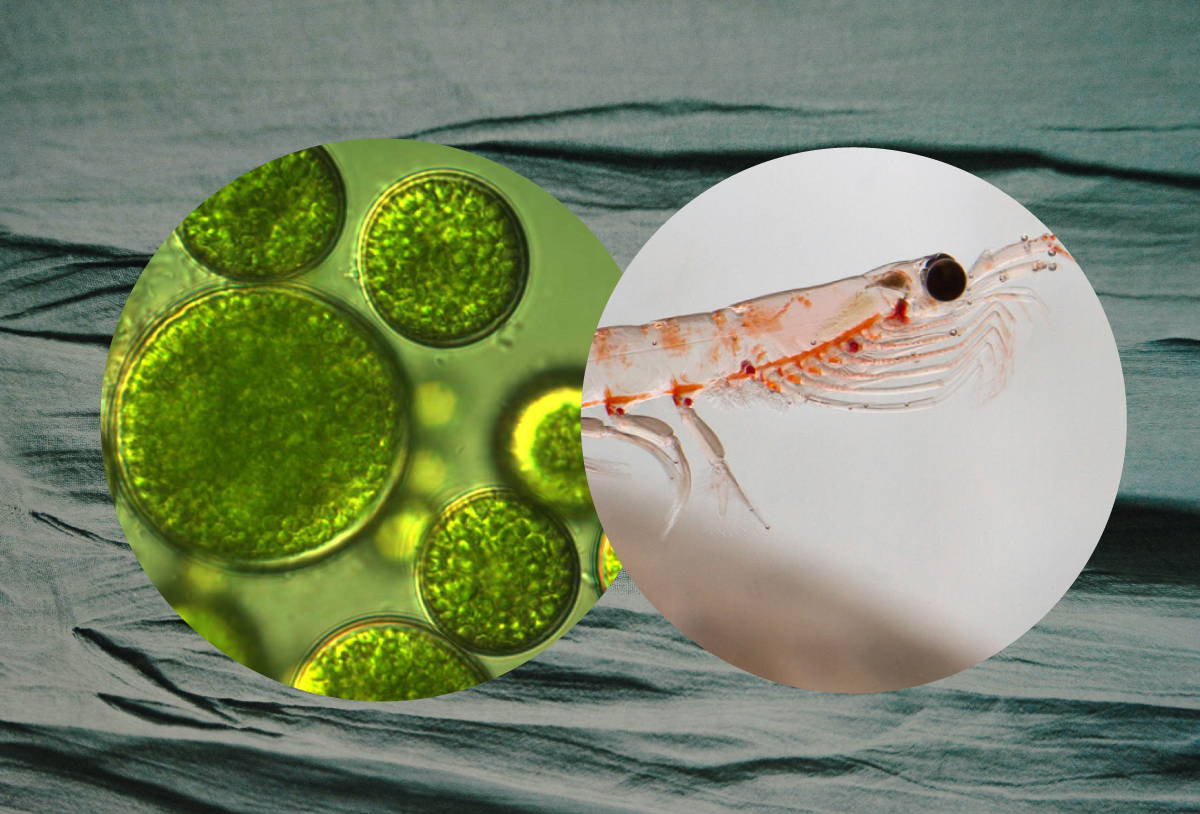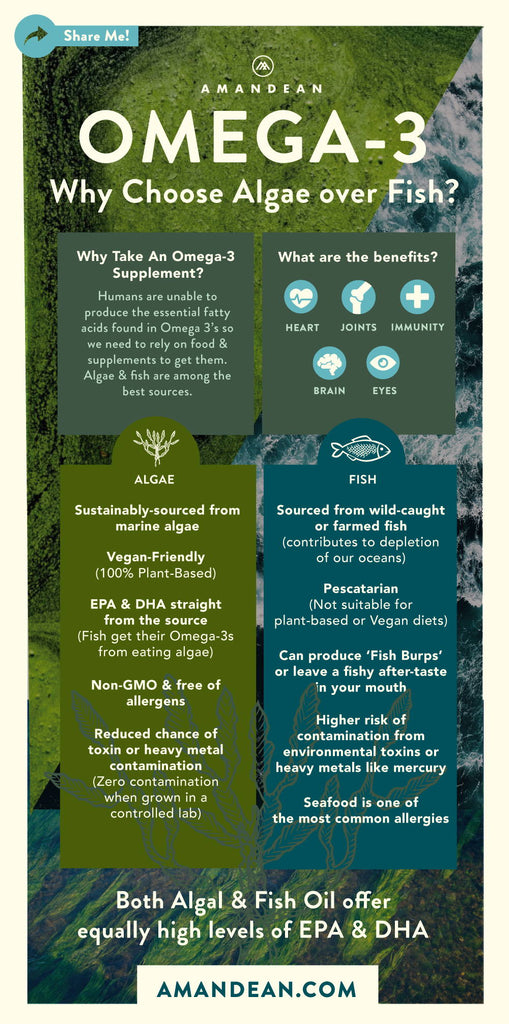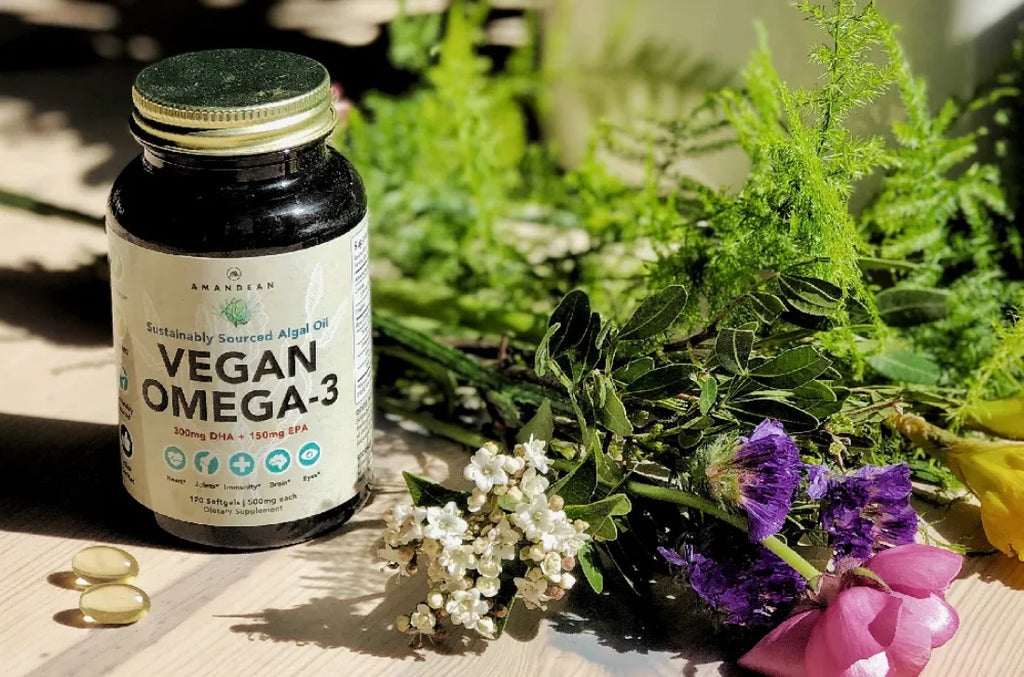Your Cart is Empty

May 21, 2020 9 min read
Ingredients matter. How many times have we heard that lately? Probably a lot. While we might all be familiar with WHICH nutrients we need to supplement, we’re not always certain what source they should come from. So again, ingredients matter, and so does their source. Today we’re talking about Vegan Omega-3 supplements sourced from Marine Algae, vs. Omega-3 from Krill. Let’s dive into the science.
Take our quiz and find which supplements your body is craving.

There’s a bit of a battle going on between Krill oil and Vegan Omega-3. Both are two of the most popular sources of omega-3 fatty acids when it comes to supplements. Even though the benefits are similar, there are notable differences to consider. What’s more, dietary preferences come into play when choosing your Omega-3: pescatarian, plant-based diets, or allergies may make a difference in your choice.
Why do we need Omega-3s? Why is it in our best interest to take all the factors into consideration and choose the purest omega-3 supplement offering a balanced mix of Docosahexaenoic acid (DHA) and Eicosapentaenoic acid (EPA)?
According to an overview of essential fatty acids, omega-3 fatty acids are crucial components of the cell membrane structure, heavily affecting its permeability, flexibility, and metabolism. Furthermore, these fats have been found to regulate enzymatic activity in the body, while also managing the activity of the cell-signaling pathways. The same study also recognizes the role of omega-3 in the improvement of the molecular structure of cells, as well as optimizing production of red blood cells.
If you’re physically active, or you’re struggling with joint disorders, an omega-3 supplement should have a place in your cabinet. David Kiefer and colleagues emphasize the role of these fatty acids in joint health, especially when it comes to inflammation-related conditions, as well as joint tenderness and stiffness in arthritis patients. Speaking of inflammation, supplementing with omega-3 has been associated with a reduction in the production of pro-inflammatory elements such as eicosanoids and cytokines, a study by Calder P. C. states.

Given the fact that the fatty acid DHA represents a structural element in the eye retina, it is no surprise that supplementing with a DHA-enriched omega-3 supplement has been associated with optimal eye health and eyesight. What’s more, a DHA-fortified formula has been shown to promote eyesight in infants. But the impact of omega-3 on the development and health of infants does not stop there.
Keeping your omega-3 levels balanced with daily supplementation during pregnancy and the breastfeeding period has been found to result in higher IQ scores in children, promote their communication and social skills, promote overall cognitive functions, and aid in their development in general. What’s more, a study on the consumption of omega-3 fatty acids and women’s health suggests that these fats have been found to contribute to fetal brain development and increased weight at birth. Also, there was found to be a reduced risk of hypertension during pregnancy and the gestation period was longer.

And if you’re struggling through painful menstrual cycles, you should know that omega-3 fatty acids have been found to significantly ease these unpleasant symptoms - including abdominal cramps. In case you’re interested in more benefits exclusive to women, make sure to check out our full guide of the role of omega-3 in female health.
Other significant roles of omega-3 fatty acids worth mentioning concern mental health (especially anxiety and depressive moods), heart health (significant impact on the entire cardiovascular system), and the state and appearance of the skin (mostly through improved hydration and limited oil production).
While krill supplements seem to be wildly popular, many people may not be familiar with their exact source. Krill oil is sourced from a crustacean of the same name - resembling shrimp - which can be found on the menu of numerous sea inhabitants including whales and penguins. Krill is often found in the cold waters of Japan, Canada, and Antarctica, and some consider it a favorable alternative to traditional fish oil supplements. In contrast to fish oil, krill oil is absorbed and utilized in the form of phospholipids. Aside from the concentrations of DHA and EPA, krill oil also contains phospholipid-derived fatty acids (PLFA), as well as astaxanthin, which is a carotenoid antioxidant.

One of the potential advantages of krill oil over fish oil seems to be in bioavailability. According to a comparative study , the fats present in krill oil may be more easily absorbed since fats from fish oil are mostly stored in the form of triglycerides, as opposed to phospholipids in krill oil. When it comes to optimizing the levels of DHA and EPA, there seems to be no difference in the efficiency of krill oil and fish oil, a study conducted by Yurko-Mauro K. et al. suggests. What’s particularly interesting about both krill and fish oils is that they have been shown to boost the omega-3 levels in the body, while also increasing the amount of low-density lipoprotein (LDL) cholesterol which is considered bad cholesterol.
It’s pretty clear that we’re talking about two completely legitimate omega-3 sources, so some may think that the differences are hardly noticeable. However, when broken down into important factors, the striking difference in the quality of these two supplements may surprise you.

As we’ve already mentioned, krill oil is sourced from a small shrimp-like crustacean krill. Therefore, unlike algae-sourced Vegan Omega-3, krill oil isn’t suitable for plant-based or vegan diets and may affect those with allergies to fish or shellfish. Furthermore, krill is most often sourced from Antarctica and is a vital food source for whales & penguins. In fact, a lack of krill in these waters could result in the vanishing of many animal species, hence the questionable status of krill as a sustainable omega-3 source. If you’ve watched any David Attenbourough lately, you might be tempted to look for plant-based sources.
Vegan alternatives to krill come from marine algae, which can be harvested in oceans or lab-grown in a controlled environment. So as well as ecological considerations and minimizing impact on our oceans, vegan-sourced omega-3s also reduce the risk of ocean pollutants or heavy metals often detected in marine-sourced supplements.

According to an investigation on the activities in the krill fishing industry, the commercial fishing interests involved in krill exploitation are a potential threat to the ocean fauna. What’s more, intensive krill fishing practices seem to be conducted in the very feeding grounds of whales and penguins, creating competition for this essential food source among animal species. What’s more, the majority of these fishing practices are considered unsafe for ocean wildlife and the seafloor, as the fishing vessels are often anchored very close to the protected areas. Needless to say, when it comes to such intensive exploitation, there’s always a risk of accidents such as fuel spills and fires.
As far as sustainability is concerned, a comparison of omega-3 sources by Handley Turner suggests that the issue with both fish and krill supplements is in overfishing, which promotes global food insecurity, negatively impacts the ocean food chains, and destroys coral reefs, thus contributing to overall climate change.
Finally, as krill oil is sourced from shrimp-like creatures, consuming it may come with unpleasant side effects including fishy burps and strong aftertaste. By contrast, with algae omega-3, especially those manufactured from lab-grown algae, you’ll avoid the issue altogether.
One of the main advantages of algae products over krill supplements is the fact that it is the algae the krill consumes that makes krill an omega-3 source in the first place. It would make sense that sourcing the fatty acids from algae itself means targeting the very source of omega-3s instead of adding an extra step in the processing routine. Therefore, omega-3s from algae have been recognized as sustainable sources of DHA and EPA, as the choice of the raw materials in the process make the products completely traceable.

Additionally, an overview of algal oils further supports the position of algae supplements as the favorable alternative to marine sources. Namely, one of the main advantages concerns the lack of cholesterol in algae - as opposed to fish and krill oils. The mentioned overview also states that algae do not contain potential contaminants, unlike marine sources. Finally, the sourcing of algae is free of environmental risks, in contrast to those associated with krill oil production.
There are many reasons for you to prioritize the DHA:EPA ratio when shopping for an omega-3 supplement, as well as the source. One of these reasons concerns the inflammatory pathways, as a balanced relationship between the two has been recognized as one of the main prerequisites for the anti-inflammatory activity of omega-3. In addition, optimizing the DHA:EPA ratio has also been associated with promoted cell health, an improvement in cognitive functions, as well as neurological development.
When it comes to omega-3 sources containing balanced DHA:EPA proportions, a study conducted by S. Doughman and colleagues suggests that algae omega-3 sources have been found to contain a DHA:EPA ratio similar to the natural rate in the body. Consequently, supplementing with an algae-sourced product is considered the most natural way of supplying our body with a sufficient dose of both fatty acids. What’s more, the mentioned study highlights the fact that fish oils contain a strikingly different ratio of these two fats which may be hard to process and utilize. Finally, the suitability of algae-sourced supplements are considered safe when it comes to infants, pregnant and breastfeeding women, the elderly, as well as individuals allergic to fish.
As far as price points are concerned, algae-sourced omega-3s generally have a higher cost as compared to krill oil. The rather demanding production process, as well as the quality of the product demonstrated through all the factors we’ve discussed so far, justifies the price point. Ultimately, the point of choosing the best brand of omega-3 supplement for optimal health, is getting your money’s worth - which is why we encourage you to focus on the small print in the list of ingredients.

Ginny Messina, MPH, RD suggests that you should pay close attention to the amount of fatty acids you’re getting in each pill. Therefore, based on her comparison, if you purchase a bottle containing 60 pills, and the recommended dose is two capsules a day - it will only last a month. On the other hand, algae-sourced products often contain a much higher concentration of DHA and EPA in a single pill, which means that the bottle will last longer. When you do the math, the seemingly affordable alternative isn’t that much of a wiser choice after all.
To sum it up, when selecting your supplementation, it may be hard to disregard the flashy adverts and take the time to focus on scientific evidence. While we understand the hesitation to invest your time in researching different products, we strongly encourage you to start reading the labels, consult with health care professionals, and prioritize your well-being. After all, your health should not be a matter of compromise, and even though the market may be overflooded, recognizing quality may be easier than you think. Interested in more of our all-natural, sustainably sourced products? Check out our full line here.

December 12, 2025 7 min read
Achieve luscious locks with collagen for hair. Try Amandean’s premium collagen supplements for stronger, healthier hair.

December 12, 2025 10 min read
Collagen packets by Amandean make skin, joint, and hair support easy on the go. Learn how collagen packets work and upgrade your wellness routine today.

October 17, 2025 8 min read
Find out why creatine is better for vegans! Boost your wellness game and unlock peak performance with Amandean's premium supplements today.